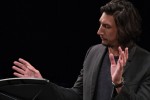Title

Joanne Tucker, Joseph W. Polisi, Adam Driver, Katori Hall, James Houghton
(Photo by Chad Heird)When Adam Driver (Group 38) arrived at Juilliard a decade ago, it wasn’t necessarily clear that he’d be an international superstar (a few weeks after this issue goes to press, the latest Star Wars movie, in which he’s the villain, will come out). It was clear, however, that he had a lot of ideas and a burning desire to make them happen.
This panel and the idea of the artist as citizen are explored in a new interactive episode of Juilliard Open Studios. Go to JuilliardApp.com and start your free one-week trial today.
Body
Shortly after arriving at Juilliard in the fall of 2005, Driver, not long out of the Marines and convinced that no civilian obstacle was too difficult to overcome, requested a meeting with President Joseph W. Polisi. Earlier that year, Polisi’s book The Artist as Citizen had come out and Driver was on a mission to embrace the concept. In their meeting, Driver asked about the possibility of having a small group of drama students present plays in Iraq for Marines. From that seed grew Arts in the Armed Forces (AITAF), which is now a thriving nonprofit that produces performances for current and former service members and their families.
This history was recounted in September at a panel discussion about the role of the artist as citizen. Driver and his wife, Joanne Tucker (Group 38), the artistic director of AITAF, were panelists, as were Polisi, Katori Hall (Playwrights ’09), and James Houghton, the Richard Rodgers Director of the Drama Division. The panel was moderated by Courtney Blackwell Burton (BFA ’02, dance), the managing director of operations for Juilliard Global Ventures.
The title of the discussion was The Artist as Citizen, a concept that has become ever more important recently as “the arts have been shunted away from the center of what our society should be about,” Polisi said. As a result, he stressed the need for every Juilliard artist to be an advocate for the performing arts. Driver and Tucker talked about their work and presented some scenes—powerful moments that, judging by the feedback, resonate with and inspire the current and former service members they work with. They also talked about how the concept of the artist as citizen informs their work. “Part of the Juilliard training is how you treat other people,” Tucker said. “Human values were very much part of our training, and that translates into the artist as citizen and then that translated into starting AITAF.”
The other panelists concurred on the need for the concept of artist as citizen to reach into every corner of life at Juilliard and outside. “We’re not a myopic place,” Houghton said. “It’s our responsibility to listen and reflect.” Prizewinning playwright Hall went further, talking about her need to put “unheard voices onstage” and saying that, for her, “the artist as citizen is a question of life or death.” The discussion was wide-ranging and sometimes intense, proof of the need to keep these issues at the forefront of our consciousness.






